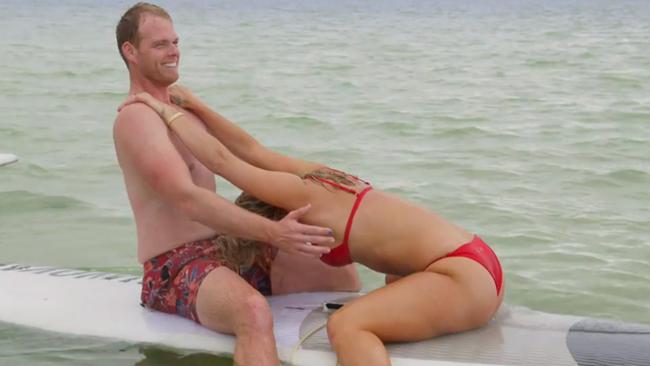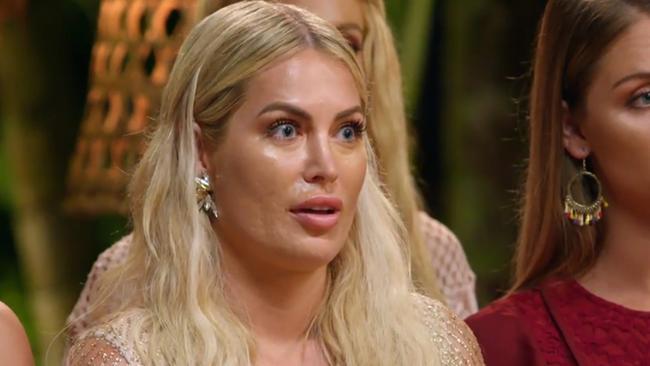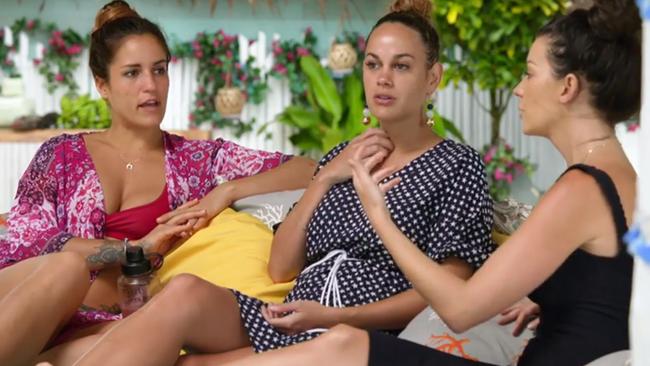Is Bachelor in Paradise a modern parable?
FUNCTIONING as a type of contemporary morality play, Channel 10’s latest dating showinvites us to consider what we would do in the same situation, writes Karen Brooks.
EVEN if you’ve never watched an episode or have been assiduously avoiding any mention, it’s hard not to have an opinion onBachelor in Paradise.
Following hot on the heels of ratings juggernaut, favourite social media hashtag and water-cooler topic, Married With First Sight and whetting appetites for forthcoming dating shows like Back with the Ex, Love Island, and Blind Date, Bachelor in Paradise is filled with Bachelor and Bachelorette losers of seasons-past who are placed together in a tropical paradise to maybe find romance, lashings of drama, and entertainment, all manufactured for viewing pleasure/outrage.
Trying each other out for size, sort of like one does a new pair of shoes, contestants are encouraged to flirt, dress according to the less-is-more code, drink an ocean’s worth of frozen margaritas and haunt each other’s bedrooms. Some are even sent on dates that borrow from every cliche in the Mills and Boon handbook while adding a contemporary spin: paddle-board yoga anyone?

Deliberately shallow, requiring rapid judgment mostly on the basis of appearance before a man or woman makes their selection on whom they wish to date, “love” unfolds before a host of cameras and national audience of millions.
This is Tinder meets Big Brother.
Described by some as “romance TV,” and compared to programs like Farmer Wants a Wife (which it ain’t), FOMO predominates. Arguably, this is why it’s so successful. That, and the fact we have a group of people prepared to put their hormones and hearts on the line for us all to critique and experience their connections or lack thereof vicariously.
Functioning as a type of contemporary morality play, Bachelor in Paradise invites us to consider what we would do in the same situation and with a particular person.
Where do our boundaries lie?
We simultaneously assess and are titillated by the behaviours screened. Knowing some of the scenarios are contrived and certainly “hot-housed” due to the cloistered environment and alcohol doesn’t appear to affect our appetite for this show and others like it.
On the contrary …

But, in what ways does this series reflect or offer serious commentary upon modern romance/dating?
Unable or unwilling to listen to their hearts, the contestants drop and pick each other up faster than an Uber-driver on speed. But there may be a reason for that.
According to Dr Pani Farvid, a senior psychology lecturer at Auckland University of Technology, “The more choice users have, the harder it is to actually choose or settle on one thing.”
Likening technological dating to a shopping catalogue filled with prospective intimate partners (much like Bachelor in Paradise), she says, “With Tinder, people might think there is always the potential for something better out there, which can create unrealistic standards or the inability to choose or commit to one person.”
On Bachelor in Paradise, we have a group of attractive young men and women overwhelmingly reluctant to “commit”, especially when their choices are continuously updated with the inclusion of new people.
Despite this plethora of choice, some very successful relationships have been initiated through Tinder and other dating apps — what about dating shows?
Romance, however it’s packaged, is strong currency in today’s world. It’s the most widely read genre, rom-coms are good box office, reality shows built around love rate, and dating apps like Tinder have billions of users.

No wonder Bachelor in Paradise and the contestants seeking their extra minute of fame are so successful. Together, they reflect our obsession with sex, romance, and love as well offering ongoing observations about them.
So why aren’t the long-term “romantic” outcomes on these series as successful as dating apps?
A study by Dr Mitchell Hobbs at Sydney University in 2016 revealed that online dating/hook-up apps, instead of being “depraved and sad” are actually “helping us find love more effectively than we’ve ever been able to before.”
While many complain about the inherent sleaziness in dating apps, Hobbs argues this isn’t the fault of the technology. People have been “looking for no-strings attached sex since the dawn of time.” More importantly, he adds, “The meaning and usage of this technology is determined by the values of the users themselves.”
Perhaps it’s the values of the contestants and producers that’s determining the meaning of Bachelor in Paradise — a superficiality and desire for “good TV” over personal ethics, or for “no strings attached sex” over commitment that, interestingly, is as often resisted as it is identified on social media.
Audiences might love the spectacle, but they also want a show with heart.
This is why such an apparently trivial program can provoke deep conversations and polarise people. It reflects the morals, behaviour and standards we’re either prepared to walk by or accept when it comes to sex and love — however they’re packaged.
It also reminds us, as Deepak Chopra once said, “The less you open your heart to others, the more your heart suffers.”
Originally published as Is Bachelor in Paradise a modern parable?
